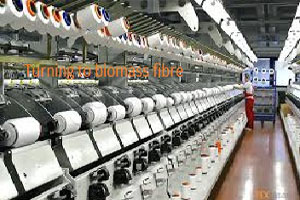
Chinese textile industry to turn from crude oil to biomass fibre
YarnsandFibers News Bureau 2017-11-22 14:00:00 – JinanHismer Bio-Tech, based in Ningyang county, Tai'an city in East China's Shandong province, is making biomass fiber from a very unusual source: shrimp and crab shells. According to Hu Guangmin, Hismer’s chair, the biomass fiber can wean textile companies’ off their reliance on crude oil.
As textile companies have long been dependent on crude oil when making common synthetic materials such as nylon or polyester but with the biomass fibers the companies could soon change, by turning to biomass fibers.
Hu said that innovation has saved the textile company from going bankrupt. The factory had trouble in business due to rising cost at home and stagnant export market. The company of 800 employees had to lay off some 200 people when the business was bad.
Five years ago, the textile producer placed its bet on developing the production technology and equipment for making the biomass material.
Hismer collects 10,000 metric tons of the shell waste from seafood processing companies in China's ports of Qingdao, Yantai, Dalian and Ningbo a year for the production of some 6,000 tons of biomass fiber. It has become the world's largest marine renewable producer.
In the backyard of the company's workshop, piles of shrimp and crab shells permeate the air with their strong odor. But after going through the company's processing machine, the shells are turned from food waste to chitosan fiber, basically indistinguishable from other synthetic fibers.
The fibre is then used by a variety of garment producers. When fashion lovers buy a stylish anti-bacterial underwear from lingerie producer Embry Form, they could hardly link it to shrimp and crab shells.
The fabric is not only used for making socks, underwear, bedding but also medical products such as masks and sanitary pads as well as special cloth used in aerospace planes.
Market Intelligence
Ask for free sample Report

experience
Customer Base
dedicated team
Countries Served Worldwide









